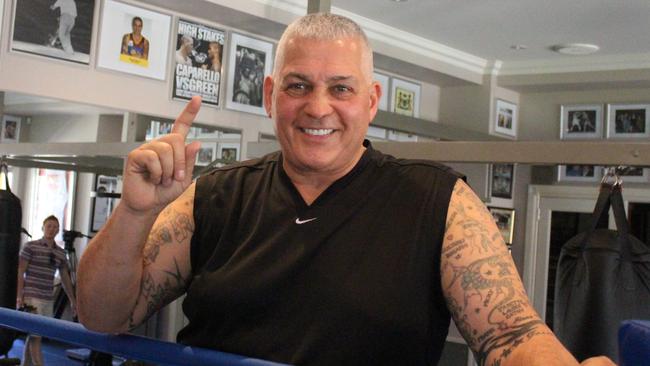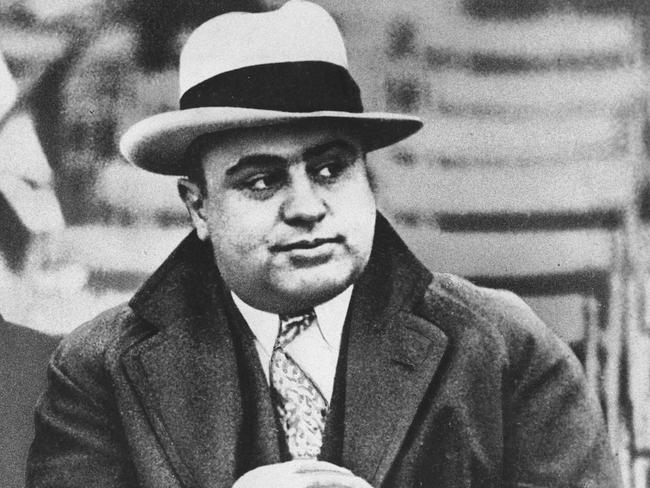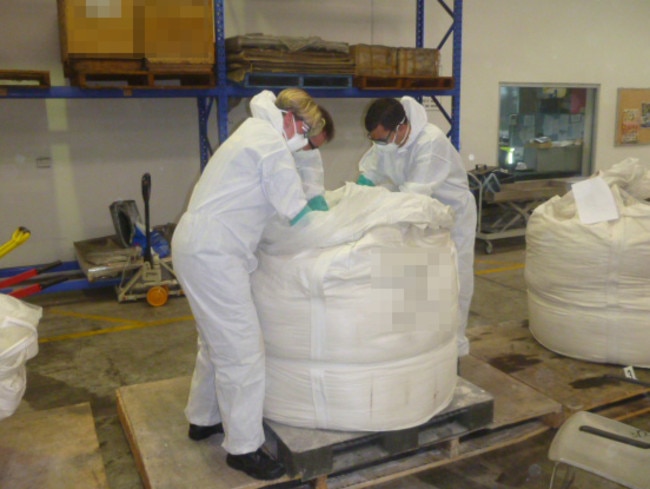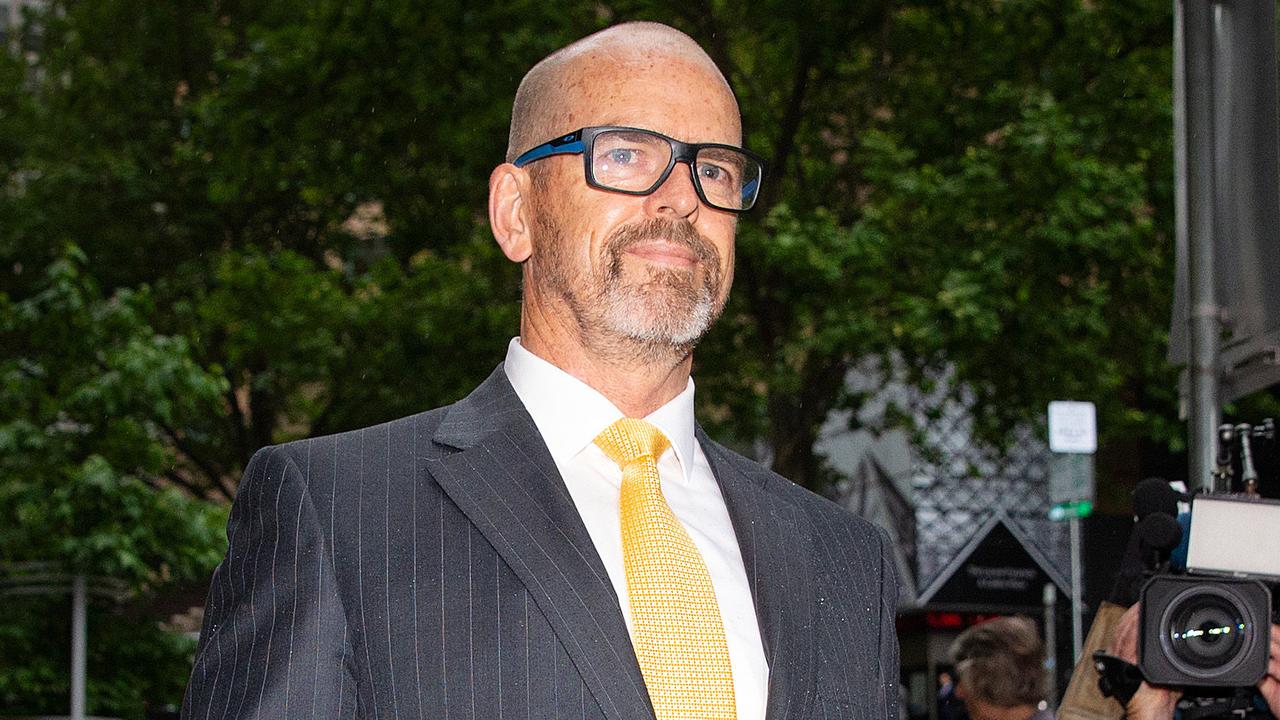Australian Crime Commission boss Chris Dawson faces battle on several fronts including the stock market rigging, terror, bikies, drugs and cybercrime
IN DEPTH: FOILING an organised crime gang’s bid to rig the Aussie stock market via companies worth $1 billion is just one of the many battles for the Australian Crime Commission’s new chief.

True Crime Scene
Don't miss out on the headlines from True Crime Scene. Followed categories will be added to My News.
AN international organised crime gang recently attempted to illegally manipulate the Australian stock market through companies worth $1 billion.
The Australian Crime Commission foiled the sophisticated plot, which could have seen the syndicate escape with tens of millions of dollars of investors’ money.
ACC chief executive Chris Dawson yesterday said he couldn’t provide further details as the probe into the illegal swoop on the stock market was continuing and was at a sensitive stage.
“Because of the fluidity of the market, the very nature of the stock market means it is attractive to serious and organised crime,” he told the Herald Sun.
In his first media interview since taking over as ACC boss in April, Mr Dawson also revealed:
THE controversial “blackest day in sport” press conference launch of the ACC’s drugs in sport report was the wake-up call sporting codes needed to crackdown on the undoubted involvement of organised crime in drugs in sport.
ACC coercive powers are increasingly being used to question young Australians suspected of terrorist links and who want to join extreme Muslim jihadist groups fighting in Syria and other overseas trouble spots.
INTELLIGENCE gathered by the ACC about Australians fighting in foreign wars has been passed to the ACC’s national security partners.
INTERNATIONAL drug gangs are increasingly targeting Australia because Australians are prepared to pay much more for illegal drugs than users just about everywhere else in the world.
MURDEROUS Mexican drug cartels are the latest to single out Australia as a particularly profitable destination to smuggle illegal drugs to.
TAIWANESE gangs have also been detected with a heavy presence in Australia.
MORE than 70 per cent of the Mr Bigs listed on the ACC’s national criminal target list as doing illegal business in Australia either lives outside Australia or have offshore links with international serious and organised crime gangs.
AUSTRALIAN bikie gangs are increasingly setting up overseas chapters and developing strong links with bikie and other criminal gangs across South-East Asia, in the Pacific region and in Europe and North America.
THE ACC has identified more than 230 organised crime targets that were previously unknown to police, including 100 nationally significant ones in the just the past year alone.
CYBER crime gangs have their eyes on the $1.6 billion that self-funded Australian retirees have amassed in superannuation cash and are working on elaborate plans to try to fleece these older Australians of their life savings.
THERE is organised crime activity at most Australian air and sea ports and crime gangs are paying big money to recruit workers in the aviation and maritime sectors so they can smuggle in drugs and other products.
THE use of encrypted technologies to disguise criminal activity is an emerging and serious threat to law enforcement’s ability to detect and disrupt organised crime gangs.
ONLINE HEISTS: Cybercrime costs us $4.6b each year
Mr Dawson said the ACC’s battle against organised crime was being impacted by successive budget cuts and the fact its computer system is decades old.
At his first Senate Estimates appearance earlier this year, he said it needed at least 600 staff to be fully effective, but was now operating with only 524. Further planned cuts will see this drop to 450 by 2017-18.
He said the Commonwealth Government had recently provided additional funding which will, in part, address the budget reductions of the past few years.
He is in the process of arguing strongly for more staff and a new computerised national criminal intelligence system to replace the ACC’s 30-year-old database.
Mr Dawson pointed out that while serious and organised crime cost the Australian community an estimated $15 billion a year, the ACC receives just $91 million which covers everything from operational costs to staffing, property and supplier expenses.
“The ACC’s Australian criminal intelligence database is now 30 years old and needs replacing,” Mr Dawson said.
“We need to have the most contemporary system in order to do the best work.
“In order to actually identify serious and organised crime targets you need to collect whole hosts of data sets and information in order to form the full intelligence picture.
“We do have systems to do that, but they are far from optimal and that’s why it’s going to be a key plank of my term to make sure we achieve that.
“Organised crime is more complex and pervasive than ever before.
“Australia requires a criminal intelligence system that better supports the production of comprehensive and rigorous national intelligence.
“I fully appreciate and recognise that we are in a tight fiscal environment, so I am not suggesting that the ACC can stand totally immune from every other institution that Government has to fund.
“However, my role as CEO is to put a strong business case before the Government and state quite clearly that the budget is a matter that I believe, as CEO, we need to address.”
Mr Dawson said even with staff cuts and an ageing criminal intelligence database the ACC had achieved remarkable results.
“For example, the ACC-led Eligo taskforce has seized more than $41 million in cash since late 2012,” he said.
“In conjunction with Commonwealth and state partners, the taskforce has also seized almost one tonne of illicit drugs with a street value of more than $790 million, restrained more than $30 million in assets, disrupted 25 serious and organised criminal groups and arrested more than 170 people on 370 charges.”
Mr Dawson said the ACC has invested $25 million in the Eligo national taskforce.
“The cash seizures alone represent a 150 per cent return and that doesn’t include the drugs seized, assets restrained or the ongoing work with the Australian Taxation Office,” he said.
“That alone — and it’s not the totality of our work — should be proof of an evidence base to say look, if you invest further it will reap dividends.
“If that is able to be addressed we will achieve even more.”
Mr Dawson also commented on the controversial “blackest day in sport” press conference launch of the ACC’s drugs in sport report in February last year.
“It was about developing a deeper understanding of the use of performance and image enhancing drugs, including the nature, extent and resulting harms of the involvement of serious and organised crime in this market,” he said.
“It was also about target-hardening a multi-billion dollar industry that not only employs thousands of people, but is of great community, national and social importance.
“The report stands for itself and I am confident Australian sport is now in a much better and informed state to work with authorities to address integrity issues that it was two years ago.”
Mr Dawson also revealed the ACC is following in the footsteps of legendary US Treasury agent Eliot Ness and his crew of incorruptible agents, known as The Untouchables.
Chicago police had no doubt Al Capone was up to his neck in organised crime.
But the wily gangster was smart enough to avoid being charged over the lucrative and violent crimes he was committing.
It wasn’t until Ness and his crew got in on the act that Capone was able to be put behind bars.
Ness pioneered the tactic of chasing gangsters for tax evasion in the 1930s.
That tactic saw Capone jailed for 11 years over tax offences.

Mr Dawson would obviously rather see Australia’s modern day Capones charged with murder, drug trafficking and other serious crimes — and many have been as a result of the ACC’s work.
But so adept have some of them become at avoiding detection by getting underlings to do the dirty work that catching them red-handed is often difficult.
Which is why the ACC is increasingly working with the Australian Taxation Office to nab them for tax evasion instead.
Some well-known Australian criminal Mr Bigs — as well as crime bosses who fly under the radar — have been hit with tax bills of more $216 million in an Al Capone-style blitz the ACC hopes will drive them out of business.
Mr Dawson told the Herald Sun why he was happy to pursue criminals with whatever tools were available — including sending them tax bills.
“If you are being attacked by a wild animal you will pick up the nearest stick or weapon to counter that threat,” he said.
“Serious and organised crime figures are often insulated because of the way they have been able to surround themselves with legitimate business fronts.
“In police parlance, we call it whether they are ‘hands on’ or not.
“If they are not hands on they have got a whole cavalcade of lieutenants and people below them that will actually do the physical criminal activity.
“So they remain insulated and remote from the crimes themselves, but are directing and in control of them.
“That presents challenges in gaining the right evidence to lay substantive criminal charges.
“But that does not in any way mean that law enforcement sits still and says they are too hard to get at.
“That’s where chasing them for tax offences comes in.
“We have worked very closely — and continue to do so — with the ATO.
“There are well-known criminal entities around Australia, which by law I can’t identify, but I can tell you that we are making very good progress with the ATO, which is hurting these criminal entities.
“The privacy and taxation laws don’t allow me to identify who they are.”
While Mr Dawson didn’t name any of the crims being done for tax, the Herald Sun has previously reported the ATO is chasing underworld identity Mick Gatto over millions of dollars it claims he owes.

Mr Dawson left his job as Deputy Commissioner of Western Australia Police in April to replacing the retiring John Lawler as ACC chief executive.
He joined WA Police as a cadet in 1976 and went on to hold senior positions in the areas of serious and organised crime, counter terrorism and state protection before being promoted to Deputy Commissioner in 2004.
Mr Dawson has reviewed English, Scottish and North American police training methodologies at a variety of respected institutions, including the Scottish Police College, the FBI National Academy, the Royal Canadian Mounted Police College and the London Metropolitan Police College.
Mr Dawson told the Herald Sun his long service with WA Police meant he had a good grasp of the organised crime picture in Australia.
But high-level briefings he has had since joining the ACC have further opened his eyes to the massive impact — about $15 billion a year — organised crime is having on the Australian community.
He was particularly surprised at the vast amount of cash organised crime is laundering through underground banking systems, such as the alternative remittance sector and informal value transfer systems.
“The alternative remittance area, that is, those outside the normal financial sector, has been a revelation to me in terms of the number of persons involved and volume of money,” Mr Dawson said.
“It is an area that is presenting to us as of quite a significant concern; I am talking serious and organised crime problems.
“It is an area which is worthy of much closer scrutiny, which it will get.”
Mr Dawson said another priority in his first year as ACC boss was to continue the ACC’s attack on the worsening bikie gang problem.
He said the latest ACC intelligence revealed there are now 40 bikie gangs operating in Australia, with about 6000 patched members.
“The romantic notion that these groups are innocent recreational collectives is a proven falsehood,” Mr Dawson said.
“There are reams of evidence against members of Outlaw Motorcycle Gangs being engaged in criminal activity of all types, including production, trafficking and distribution of drugs, extortion, money laundering, standover tactics and murder.
“OMCGs have an intimidating and forceful presence in the community and are often the perpetrators of deliberate and repeated episodes of public violence.
“Law enforcement agencies across the country are completely united in their commitment to dismantling OMCG operations and minimising their impact on the
community.
“In the 38 years I have been in law enforcement, bikies have been there.
“Regrettably, we have seen in recent times a growth in the number of bikies across Australia and quite a rapid growth in their footprint overseas.
“Australian OMCGs are opening chapters of their own in North America, Europe, across South-East Asia and in the Pacific as well as forming direct linkages with international bikie gangs.
“This is happening at a rate that everyone should be concerned about.
“We are seeing more of these groups whose members don’t even know how to ride a motorbike. They are joining because of the crime links.
“This is an area that I will make sure the commission is relentless in its pursuit and I give an unqualified commitment that pursuing OMCGs will be foremost in much of our activity.”
Another priority for Mr Dawson is to ensure the ACC stays at the forefront of the fight against the shockingly addictive drug ice.
He describes the ice pandemic Australia is suffering as being as bad as the crack cocaine problem in the US.
ICE AGE: ACC warns ice is reaching ‘pandemic’ proportions
TIDE OF EVIL: Methamphetamines linked to murders, mayhem
“Methylamphetamine, particularly ice, is one of the most dangerous drugs I have seen,” Mr Dawson said.
“It is ruining lives, ripping apart families and friendships and wrecking careers.
“The ACC is seeing unprecedented numbers of arrests, weights and seizures of amphetamine-type stimulants.
“We’re also seeing increasingly diverse domestic and transnational supply sources, for both the drug and its precursors.

“Ice is different from the other drugs in the sense that users don’t calm down at any point.
“So after scoring and using they will remain absolutely hyper and with that hyper state they are also very aggressive.
“If there are members of the community that see their friends or their kids start to enter in the use of this type of drug they should take whatever professional assistance they can.
“I have seen first-hand the results of it and the impact it has on families.
“I would go so far as to say that someone needs to do a seminal piece of work on the numbers of homicides that occur across Australia on a per annum basis as a result of ice.
“There is a great increase not only in violence but in homicides where drug debts have not been paid, where people impacted by these sorts of substances are prone to use weapons and prone to use violence because of the state they are in.”
Mr Dawson said the ACC had been involved in a number of large seizures of ice, including a 135kg bust in Melbourne last month.
Despite the busts, he admitted there was no shortage of ice on the street.
“It tells us we have got a big problem,” Mr Dawson said.
“This is an area that the commission will continue to pointedly say we must all work in a very co-ordinated way to counter it.
“We must continue to educate particularly young Australians about the scourge of this type of drug.”
Mr Dawson said while the ACC’s main role under him will continue to be Australia’s leading criminal intelligence gathering agency, he was keen for it to get more involved in investigations of its own as well as joint probes with other law enforcement bodies.
“The ACC under my predecessor, John Lawler, transitioned from a niche investigative agency to an intelligence-based one,” he said.
“In a sense, my vision is to maintain and improve on our effectiveness in the intelligence space, while also highlighting the agency’s investigative strengths.
“Just last month the ACC was involved in the arrest of two men allegedly linked to a Mexican cartel.
“You only need to look to the violence on the streets in Mexico, the thousands of people who have died at the hands of Mexican drug cartels, to realise how dangerous these people are and they are now targeting Australia as a destination to facilitate their crime.”


